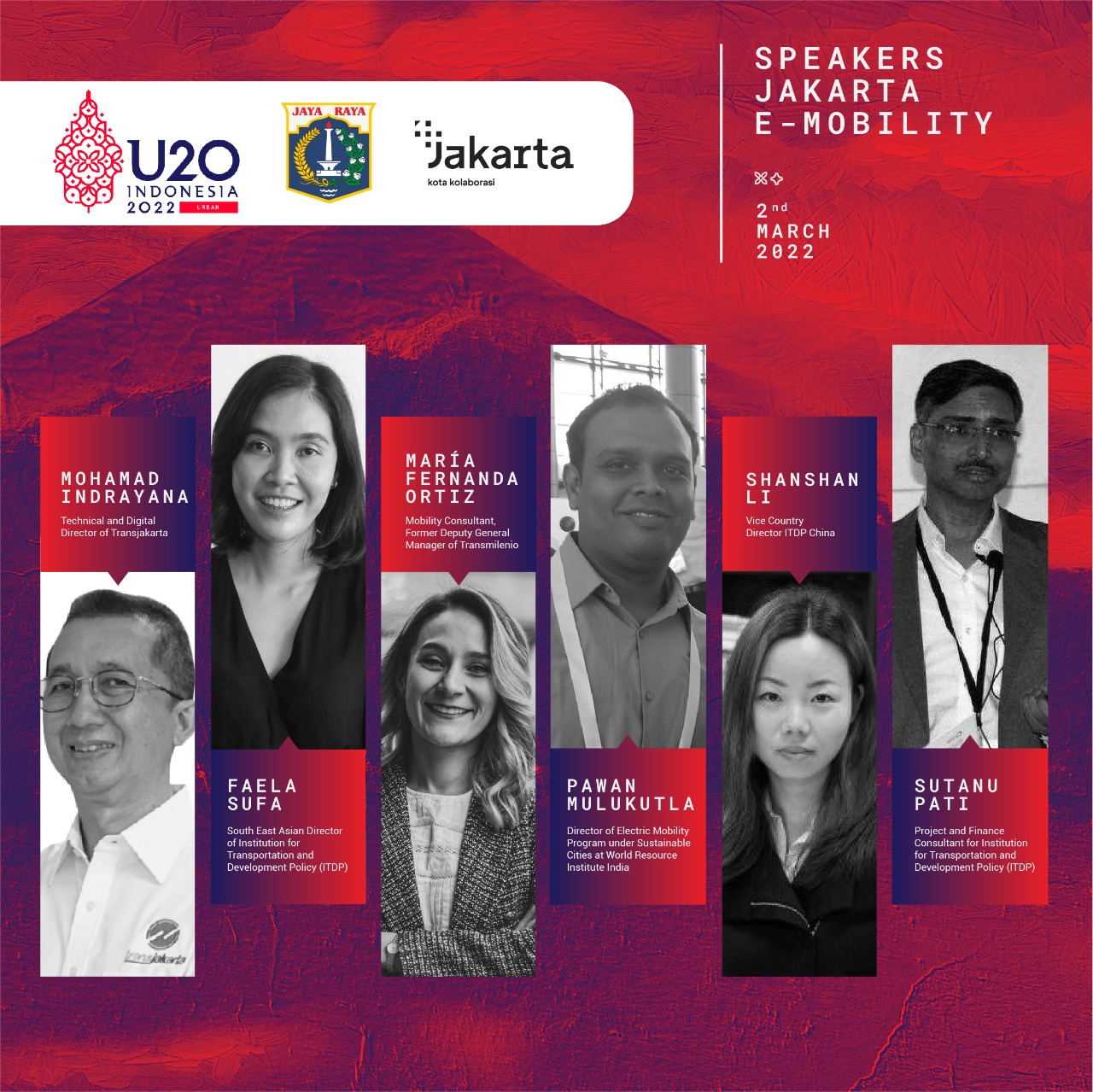Webinar on Global Case Studies with Experts from Around the World
Syafrin Liputo, Head of Jakarta Transport Agency, opened the Day 2 event. In his speech, Liputo explained the current landscapes of vehicles and public transport in Jakarta and current policies to accelerate the Jakarta electrification program.
Syafrin Liputo, Head of Jakarta Transport Agency, said:
“Jakarta’s commitment in achieving net zero-emission in 2050 is shown through government regulation 90/2021 about the action plan on low carbon development. Therefore, implementing non-motorized transport, MRT, LRT, BRT, electrification, and mandatory biofuel for vehicles are sustainable practices we must encourage and put into realization immediately. Currently, we are in the electric bus procurement process as we are preparing for depot and charging infrastructure to realize the operation of 74 Transjakarta electric buses in 2022 to mark the beginning of our journey to 100% electric buses in 2030.”
The second session of the event was filled with experts worldwide who shared and discussed global case studies, best practices, and policy reviews on electric bus deployment, technology selection, and business model for electric buses and finding dissemination to city-level governments.
Yoga Adiwinarto, Director of Operations and Safety of Transjakarta, presented the Transjakarta Electrification Plan and the current progress of Transjakarta electrification.
Yoga Adiwinarto, Director of Operations and Safety of Transjakarta said:
“Transjakarta is supporting the city’s ambition to make public transport greener and more sustainable by electrifying the whole system, as we hope by 2030 all of our buses will be electric. We begin by electrifying non-BRT buses, as it is more simple where a depot for overnight charging will do, but for the BRT we will probably need on-corridor charging. After we finish the non-BRT and low entry feeder buses, we will start electrifying the BRT. The commitment of Transjakarta is to support the city’s plan to make the city less polluting and more liveable, so the clean air mission can be achieved. By 2025 we hope to achieve the milestone of 50% electric buses.”
Pawan Mulukutla, Director of Electric Mobility Program under Sustainable Cities at World Resource Institute India explained the road-based mass transit systems in Kolkata E-Bus deployment planning and procurement process in Kolkata.
Pawan Mulukutla, Director of Electric Mobility Program under Sustainable Cities at World Resource Institute India said:
“In India, the national electric vehicle adoption program which included subsidy schemes for buses (FAME 1 and 2) significantly helped the procurement of electric buses. Other key factors in the accelerating e-buses deployment in India are the national long term vision and strategy for full transition, and strong initiatives from the local governments in implementing the electric buses.”
Followed by Faela Sufa, Southeast Asian Director of ITDP shared global landscapes and trends of e-mobility and road-based public transport electrification in the EU, USA, and Asia.
Faela Sufa, Southeast Asian Director of ITDP, said
“On-road transportation is accountable for more than three-fourths of CO2 emission from the transportation sector in 2020. Electrification is not enough – the only way to achieve the 1.50C target is to combine electrification with compact city strategies. Indonesia needs to catch up its electric vehicle uptake, while also prioritizing the shift to non-motorized transport and public transport”.
María Fernanda Ortiz, Mobility Consultant, Former Deputy General Manager of Transmilenio, a bus rapid transit (BRT) system that serves Bogotá, the capital of Colombia, and Soacha, since December 2000, shared the road-based mass transit systems in Bogota and E-Bus deployment planning and procurement process in Bogota.
María Fernanda Ortiz, Mobility Consultant, Former Deputy General Manager of Transmilenio said:
“The key elements of the e-bus transition project in Bogota are as follows: Political will of upgrading public transport system to lower emissions fleet, considering costs, quality and social benefits; bankable business model; economical support from the central sectors such as financial guarantees and payment methods; adequate distribution of risks between public and private; longer-term of the contracts; comprehensive conversation with the private sector, financial entities, insurance companies, and other stakeholders; and the presence of key partners from the energy sector”.
Shanshan Li, Vice Country Director ITDP China, shared the global experiences on climate policy and regulatory frameworks on the electrification of road-based public transport. She also presented the Indonesia landscape analysis for e-mobility specifically on the mass transit system.
Shanshan Li, Vice Country Director ITDP China, said:
“China’s success in deploying e-bus is largely driven by strong supportive policies since 2009. Several lessons learned from China to accelerate e-bus deployment include setting up a powerful electrification leading group, holding regular meetings; paying attention to charging infrastructure planning and implementation; and developing an applicable business model. Pilot operation is important for large-scale deployment.”
Sutanu Pati, ITDP Project Finance Consultant explained the overview of national and Jakarta e-mobility policy and policy and institutional gaps for road-based public transport electrification in Indonesian cities.
Sutanu Pati, ITDP Project Finance Consultant, said:
“Additional fiscal and non-fiscal policies are still needed for e-bus deployment in Jakarta. The financial assistance can be through upfront or operational subsidies for EV, land provision support, interest subvention on loans, or exemption from registration and other local taxes for EVs. Recommended non-fiscal supports include the issuance of a clear roadmap to phase-out ICE vehicles, longer contract periods for e-buses, new business models for separation of bus ownership and operations e.g. leasing of buses, battery, charging infrastructure, creating an interdepartmental empowered group to facilitate e-bus adoption (finance, energy, transportation, environment, law, etc.), and reevaluate procurement processes for e-buses.”
Watch the Day 2 Event replay on DKI Jakarta YouTube Channel
Press release are available here.
Presentation slides from speakers can be accessed through bit.ly/jakartaemobilityday2.


